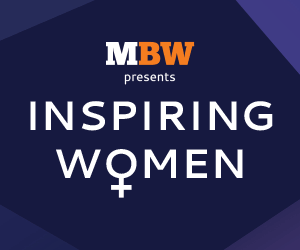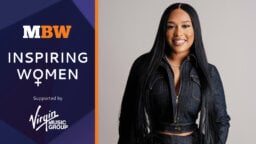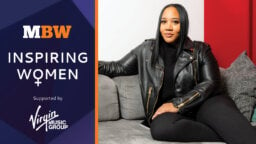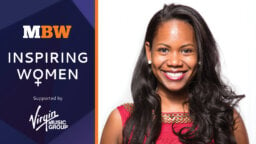MBW’s Inspiring Women series profiles female executives who have risen through the ranks of the business, highlighting their career journey – from their professional breakthrough to the senior responsibilities they now fulfil. Inspiring Women is supported by Ingrooves.

Natalie Prospere is a talent manager who advocates passionately for her clients and utilizes a love for music and a work ethic to garner results.
It’s definitely paying off: this year, Prospere’s management roster counts no less than 18 Grammy nominations at the 2020 awards ceremony.
The buzzing R&B singer Lucky Daye (signed to Keep Cool/RCA) has four nominations for his debut Painted album, plus notable records Roll Some Mo and Real Games. Producer D’Mile has seven total nominations – mostly alongside Daye – with hits like the H.E.R. and Bryson Tiller-assisted Could’ve Been plus H.E.R.’s acclaimed album, I Used to Know Her.
Meanwhile, the prolific London-born writer Varren Wade has a nomination for his work with Ella Mai for Best R&B album, having co-written her popular record, Trip; while mixing and recording engineer John Kercy has five nominations, both for his work with Lucky Daye and with Khalid (including the latter’s smash hit,Talk).
In addition, producer Camper (Darhyl “DJ” Camper) is recognized for working on Daye’s album via the records Love You Too Much and Call. (Camper is a Grammy alum himself, having won Best R&B album last year for his work on H.E.R.’s debut LP.)
Born to West Indian parents from Jamaica and Montserrat, Natalie Prospere’s musician father, a former calypso singer, introduced her to the music business at a young age.
After graduating from college and being in social work for three years, Prospere knew she was living outside of her calling. She visited L.A from the east coast in 2010 and decided not to go back.
Her career in music began then, managing friends from college. Last year, Prospere partnered with Paris Hines to launch Outlihers, a multi-hyphenate management company that now represents creatives from all sides of the business including Lucky Daye, Varren Wade, Tone Stith, Audio Push, producers D’Mile, and Camper, and engineer John Kercy
Here we chat with Prospere about how she got her start in the business, her management style, and what she feels is the key to changing the industry for the better…
How did you get into the music business?
I’ve always loved music and it’s always been a part of who I am as a person.
In college I managed a group named Envy out of Bloomfield. They were really just my friends. They needed a manager and at the time I didn’t know what that looked like, but I wanted to help them. Because of the relationships I made working with Envy, I was connected with Varren [Wade]’s group. They had signed a deal with Geffen in 2007 and were looking for help.
They wanted to build an audience in the US coming from London, and because I knew so many people at college and universities, my uncle, who was friends with their manager at the time, connected us. I went to their Myspace page and was immediately impressed.
What was the pivotal moment where you knew you wanted to be in the music business full-time?
It was one day being in the studio in New York. I grew up in them because my dad was a calypso artist named Supreme who won competitions in the West Indies when he was younger. By the time I was born, he had joined the church and become a gospel artist.
The house I grew up in in Boston had a studio in it and gospel artists and groups used to come record [there]. So being back in the studio with Varren’s group was nostalgic for me. I grew up singing in church and playing keys and drums, but knew I didn’t want to be an artist; I’m not fond of too much spotlight or attention. I just love music, and I love people.
“Seeing the way that some people treated artists bothered me. No-one was listening to them.”
Sitting in the studio with them brought me back to being in the studio with my dad and my family. I just realized that there might be a space for me to do something behind the scenes.
Also seeing the way that some people treated artists bothered me. No-one was listening to them, and at the time I didn’t have a position or place to intervene, but I noticed that and wanted to be a part of changing that. I did not like seeing people leverage their position and power to be disrespectful and rude to artists.
How would you describe your management style?
For me to manage anyone, I have to be a fan first.
Going into it with a fan mindset; I don’t come in to tell anyone who to be or what kind of music to make. I already love what they do, so it makes it easier for me to facilitate things for them.
“If you don’t believe in a product, how do you really sell it?”
I’m passionate about the work I do, so I work hard to help them achieve their goals. My role is to support their vision, not to give them their vision. I’m here to advise and help them make sound decisions.
I’m also friends with the guys, but I don’t tell them what to do. The moment I can’t get behind the music or believe in the vision, then I should probably help an artist find someone who does. If you don’t believe in a product, how do you really sell it?
In recent years, there’s starting to become a trend of managers becoming partners with their artists in lieu of a traditional management agreement.
I would first like to give a huge shout out to my very good friend Ty Baisden. He is responsible for breaking Brent Faiyaz and one of the smartest people I know.
Ty was one of the first people to get me into the mindset of partnering with artists. I don’t think most people understand the amount of work that goes into what becomes the product that they enjoy. We handle so many things on behalf of our clients, beyond the art.
I’m a proponent of partnership because it gives both parties a true stake in what they’re doing. Both parties attorneys should work to ensure that the terms are fair, so that everyone feels good about the agreement they’re entering into.
How did you sign Lucky Daye and what do you hope for his future?
I’ve known Lucky for years. I met him when I was managing a studio in 2011 and was blown away first by his songwriting. It was clever, and I loved his melody choices.
I was in the control room when he was working. He also worked really fast. The minute he went in to lay down the demo and I heard his voice, I knew he was one of one. We’ve been friends since then.
However, I was actually brought back into his career when I started managing D’Mile. Lucky would always send me music over the years. We’re in the same circle of friends. He’s one of my favorite songwriters so I’d always want him in sessions with my guys, Camper and David Wade.
“Aside from success, which is inevitable for someone as gifted as Lucky, I want for him to be proud of work we do, and that we did it his way.”
D’Mile and I had been friends for years as well. When D came to me for management, I was geeked. Huge fan of his work. I asked him what artists he was excited about; he told me that him and Lucky had done some music. As soon as he said that, I knew what time it was: one of my favorite producers and favorite singer/songwriters had teamed up. Two superheroes. I couldn’t wait to hear what they’d created.
The first record D’Mile played was Karma. I kid you not, I literally said ‘Ohh, you guys are trying to win Grammys over here?! Got it.’ Then he played Roll Some Mo. I was done.
I asked how many songs they had and what the plan was. We met with Lucky after that, and asked him what he wanted to do. He was open to being independent or going the major route, and he honestly just wanted people to hear his art. Aside from success, which is inevitable for someone as gifted as he is, I want for him to be proud of work we do, and that we did it his way; not following any trends or someone else’s blueprint.
Authenticity is very important to me. Lucky is going to be around for a long time. Ultimately, what I want for him and everyone on my roster is to have peace and leave a lasting impact on the world, through music. Legacy.
In your opinion, do you feel like new artists should stay independent or sign to a major?
I understand both routes and manage clients that are in different situations. There are pros and cons to both.
For me, it’s honestly up to the artist and what they want. Some artists want to things to move fast, and understand that the support of the machine influences that. It doesn’t guarantee anything, though, and that’s important for them to understand.
It’s case by case for me. I know a lot of artists and I will say that, unfortunately, [their] decision is often made based on financial need. Which is why it’s important to me to that they understand both routes and what they’re giving up for that advance.
“We know that going the major route, you are going to get more money upfront but it requires that you give up equity. Anyone who knows me knows I advocate for ownership.”
Artists typically don’t have full-time jobs and dedicate all of their time to creating. We know that going the major route, you are going to get more money upfront but it requires that you give up equity. Anyone who knows me knows I advocate for ownership.
The independent route works for artists who have their own money to invest and aren’t necessarily in a financial bind. I also understand artists want to sign with a major. [It’s] back to time; being independent takes time.
With a major label partnership, you have an opportunity to see the fruits of your labor faster, with man power and financial backing of the machine.
What was the catalyst to sign Lucky to Keep Cool/RCA Records?
Lucky and I started having conversations about his publishing situation and that sparked some label conversations. The one person I told him absolutely had to hear this music before he made a decision was Tunji [Balogun, Keep Cool’s co-founder and CEO]. They didn’t know each other at the time.
[Prospere and] Tunji knew each other, but [we] really became friends at the session for Best Part [Daniel Caesar and H.E.R.’s 2018 Grammy-winning song]. We were both in the lounge at the studio working, and got a chance to really talk. I literally love everything that Tunji has signed and have immense respect for him as an executive. He just gets it. He’s gifted.
“I literally love everything that Tunji has signed and have immense respect for him as an executive. He just gets it. He’s gifted.”
Tunji is super busy, so it took me weeks to make it happen. He wanted me to send the music and I refused [laughs]!
I have this thing where I need to be there when someone I respect hears music that I’m passionate about for the first time. We finally got the meeting with him, I brought Lucky D’Mile into the office to play the music for him in person. He text before we even got in car and told me he wanted to sign Lucky. And the rest is history.
What can the industry do to support women managers and executives in general better, even if it’s on a day-to-day basis?
Honestly, it’s the simplest thing.
We deal with so much on an everyday basis; there are so many challenges for managers in general. We are in a daily battle for the interests of the people we represent. It would make things so much easier if everyone made an earnest effort to be kind, but at minimum, respectful.
We all are making decisions in the interest of the people we work with, and sometimes that puts us at odds. That shouldn’t mean that things become disrespectful. We should be able to disagree and still respect each other.
Sometimes people get irate, and start yelling and cursing, and I just don’t tolerate that type of energy in my world at all. Not even in business. There are people I won’t even answer the phone for, because they’ve crossed that line. I don’t care who you are or how much much money we might miss out on. Zero tolerance policy.
“I do my best to be kind to people in general, no matter what I have going on or what mood I’m in. But I’ve found myself in conversations with men in this business who are not that way.”
I was raised to be respectful to everyone, even if I’m having a bad day or I’m upset. I do my best to be kind to people in general, no matter what I have going on or what mood I’m in. But I’ve found myself in conversations with men in this business who are not that way. As a woman, I don’t believe that I should have to pretend to be cold and not have feelings in order to be in this male-dominated business and be respected.
I try not to make decisions based in emotion, but part of a woman’s magic is her sensitivity. I won’t allow my career to determine the type of human being I am. That’s called selling your soul. And I won’t do that for anything or anyone.
As a woman I should feel safe. And if at any point I feel attacked by a man, even verbally, that conversation is over. That doesn’t exist in my reality. Adults should be able to communicate calmly.
It’s interesting that women are seen as emotional, but some of these men are the ones who can’t seem to control theirs. Talk to me nice, or don’t talk to me at all. Those are the options.
If you go back to day one in the industry, what advice would you give to yourself?
Take care of yourself first, Natty. I’m just coming to the understanding of how important self-care is, 10 years into doing this full-time.
You have to make sure your own cup is full before you go try and fill everyone else’s cup. When you do that, you feel empty, and those are the days where you don’t want to do this anymore. But if you keep your cup full and give your overflow to everyone else, you can continue to go as hard as you need to go every day to keep things everything afloat.
This is a demanding and high pressure job, and it requires a charged battery. That comes with taking care of yourself. As managers, our life can become only about what our clients want and need, which is unbalanced. It takes the joy out of it.
If I could give you a magic wand to change one thing about the music business, what would it be and why?
I would love for everyone to see everyone else as humans and treat and respect each other that way.
I don’t believe in the hierarchy of artists being more above everyone else and therefore allowed to be rude and treat the people who work on their behalf however they want. That’s out.
“Ego also makes people feel like we’re competing with each other when there’s absolutely no reason to. There are over 7 billion people in this world.”
This business is full of so much ego. There just needs to be respect amongst all people in this business. If I could wave a magic wand, I would get rid of all the ego in this industry and put love back into it.
Ego also makes people feel like we’re competing with each other when there’s absolutely no reason to. There are over 7 billion people in this world. People love music. There’s enough out here for us all, friends.
What do you think it takes to break an artist?
It starts for me with the product. The music. The reason Lucky is cutting through the noise the way he is, is because the music is undeniable.
Then I’m able to set everything else up around it to support that. Also, that part: creating the right support system around the product. If this album was still sitting on D’Mile’s hard drive, it wouldn’t be out there for the world to experience and enjoy. It takes the right team, the right support, and the right plan.
The way we roll out Lucky’s music and content is based around how people are responding. We pay attention to his fans. I study his fans at his shows; I take note of what songs they scream over when the band starts to play them, I read his comments. We care that much.
A lot of it is timing, and some of it is just simply luck. No pun intended. Sometimes the stars just align in your favor and you get four Grammy nominations. More than anything, I believe in favor. When God is in it, the possibilities are endless.
What is the five-year plan for you?
I would love to venture into other parts of entertainment. Like producing events. We threw a Pre-Grammy event last year called ‘Friends Only’ that I’m very proud of. I want to do more of those.
I also have experience in the TV and film world and I really enjoy it. I think I may have an eye for casting. I always wanted to be a radio show host before podcasting was a thing; I’m working on my podcast now. I love animated movies and shows. It would be cool to work on something fun for kids. I have ideas for TV as well. I would love to write for TV.
“I have a special place in my heart for music. It will always be my first love.”
I have a special place in my heart for music. It will always be my first love. So even exploring other ways to be in music, like music supervision. Some of my clients want to act and model too, which I love. I like learning new things.
I’ve been doing the day-to-day side of managing for the last 10 years , so I’m excited to expand on what we’ve built, and explore other ways to use my gifts and abilities. I want my time on this earth to be meaningful and leave an impact that outlives me.
That means paving the way for the little girls, especially of color, who may want to be on the business side of entertainment as well. I want to be an example to them of doing it the right way, with love, integrity and kindness.





